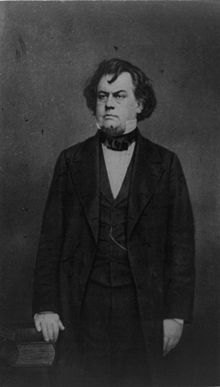Robert Toombs | |
|---|---|
 | |
| 1st Confederate States Secretary of State | |
| In office February 25, 1861 – July 25, 1861 | |
| President | Jefferson Davis |
| Preceded by | Position established |
| Succeeded by | Robert Hunter |
| United States Senator from Georgia | |
| In office March 4, 1853 – February 4, 1861 | |
| Preceded by | Robert Charlton |
| Succeeded by | Homer Miller |
| Member of the U.S. House of Representatives from Georgia's 8th district | |
| In office March 4, 1845 – March 3, 1853 | |
| Preceded by | Constituency established |
| Succeeded by | Alexander Stephens |
| Member of the Georgia House of Representatives from Wilkes County | |
| In office 1837–1843 | |
| Personal details | |
| Born | Robert Augustus Toombs July 2, 1810 Washington, Georgia, US |
| Died | December 15, 1885 (aged 75) Washington, Georgia, US |
| Political party | Whig (Before 1851) Constitutional Union (1851–1853) Democratic (1853–1885) |
| Alma mater | University of Georgia Union College University of Virginia |
| Signature | |
| Military service | |
| Allegiance | |
| Branch/service | |
| Years of service | 1861-1863 (CS Army) 1863-1865 (Georgia Militia) |
| Rank | |
| Commands | Toomb' Brigade |
| Battles/wars | American Civil War |
Robert Augustus Toombs (July 2, 1810 – December 15, 1885) was an American politician from Georgia, who was an important figure in the formation of the Confederacy. From a privileged background as a wealthy planter and slaveholder, Toombs embarked on a political career marked by effective oratory, although he also acquired a reputation for hard living, disheveled appearance, and irascibility. He was identified with Alexander H. Stephens's libertarian wing of secessionist opinion, and in contradiction to the nationalist Jefferson Davis, Toombs believed a Civil War to be neither inevitable nor winnable by the South.
Appointed as Secretary of State of the Confederacy (which lacked political parties) Toombs was against the decision to attack Fort Sumter, and resigned from Davis's cabinet. He was wounded at the Battle of Antietam, where he performed creditably. During the Battle of Columbus (1865), Toombs's reluctance to use canister shot on a mixture of Union and Confederate soldiers resulted in the loss of a key bridge in the war's final significant action. He avoided detention by traveling to Europe. On his return two years later, he declined to ask for a pardon, and successfully stood for election in Georgia when Congressional Reconstruction ended in 1877.